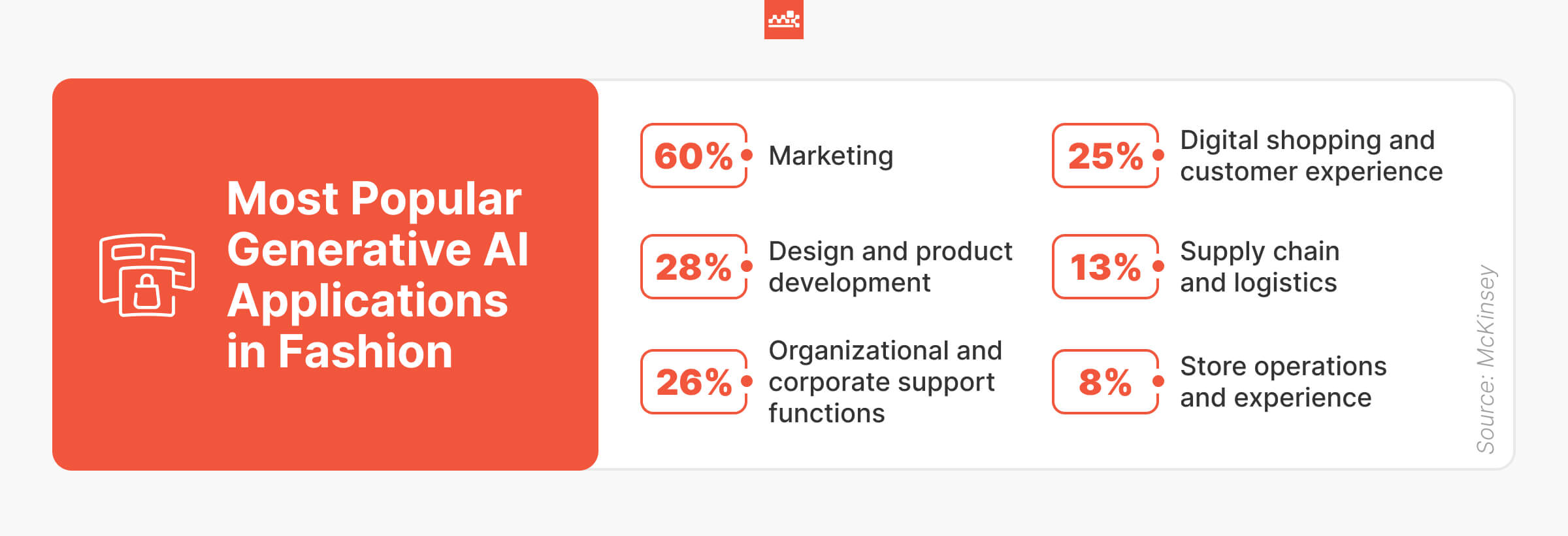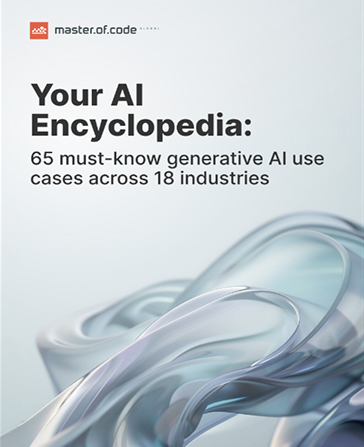Fashion is a highly dynamic and competitive industry, where consumers’ expectations are constantly rising. Consequently, businesses are forced to look for innovative means to satisfy growing demands. Not surprisingly AI has long been a key player, mainly in the form of chatbots and virtual assistants.
For instance, one well-known luxury jewelry firm collaborated with Master of Code to launch a routing bot. It ensures that clients receive instant help, irrespective of their time zone or staff working hours. As a result, we get happier customers and less overloaded support teams.

Companies like Burberry, Louis Vuitton, Gucci, H&M, Zalando, and many more have also used conversational agents. Overall, such tools elevate the standard of client care in the sector. And with Generative AI in fashion, organizations can advance even further, turning most pain points into opportunities.
In this article, we’ll unveil six unique success stories from top industry leaders. Let’s see in practice how AI boosts brand presence in the market and addresses the domain’s growing challenges.
Table of Contents
9 Must-Know Insights for Industry Success in 2024
Before we delve into real-world examples of Generative AI in fashion, let’s review 10 crucial industry trends and numbers predicting the sector’s future:

- 42% of online shoppers feel unrepresented by model images, while 59% are dissatisfied with products that look different on them than expected.
- Gen AI could add $150-275 billion to the apparel, fashion, and luxury domains’ operating profits in 3-5 years.
- 73% of executives plan to prioritize this technology in 2024, but only 5% find themselves ready to use it effectively.
- In 2024, the field is anticipated to experience the effects of demand fluctuations that have characterized the preceding years.
- 71% of business leaders will also increase brand marketing budgets in 2024, focusing on building emotional connections with customers.
- Extreme climate events threaten the lives of workers and could put at risk $65 billion in apparel exports by 2030.
- The fashion industry is projected to see a 2-4% growth in yearly retail sales in 2024.
- To combat inflation, 25% of executives expect price increases of over 5%.
- 80% of consumers in the US, UK, and China intend to shop for style items while traveling in 2024, with 28% spending more than the previous year.
With these data in mind, let’s explore the practical applications of Generative AI in the field. We’ll examine how this technology addresses current and emerging challenges, and how it can secure a competitive advantage.
Top Areas in Fashion Where Gen AI Technology Shines: Success Stories
Customized Shopping Experience
Generative AI upgrades the shopping experience by tailoring it to individual preferences. With the help of technology, companies customize web pages and product descriptions based on consumer profiles. Artificial intelligence also revolutionizes apparel try-ons and demos. It offers personalized clothing options and styling tips. Such bespoke communication can potentially boost revenue by 5-15% and elevate ROI by 10-30%.
Furthermore, AI enhances client support services, with intelligent agents like chatbots and virtual assistants providing advanced, multilingual guidance. They handle complex inquiries and deliver custom recommendations. The approach makes the buying journey more intuitive and responsive to personal needs. Targeted marketing elevates user satisfaction, drives significant business growth, and strengthens customer-brand relationships.
A notable success in Generative AI applications in client care is the Zalando conversational agent. Let’s now examine its main features and value for the company.
Zalando AI-Powered Assistant
The Zalando Assistant, a ChatGPT-powered chatbot, transforms online shopping by offering personalized fashion advice. Developed in a remarkable five-week sprint, it leverages Generative AI to cater to individual style preferences. As a beta tool, it’s designed to adapt and evolve with customer usage, ensuring a responsive and engaging buying journey.

Clients interact with the bot to receive tailored outfit recommendations and style guidance. Through consumer interactions, the assistant sharpens its accuracy in providing relevant clothing tips. With a focus on personalization, the tools aim to make online apparel shopping more intuitive and satisfying for its users.
Marketing and Trend Prediction
In 2024, 71% of fashion executives are planning to increase brand marketing budgets. And Gen AI can become instrumental in this direction. It analyzes unstructured data for precise trend prediction and customer segmentation.
It also identifies consumer sentiments and behaviors, informing targeted outreach campaigns. For example, AI can personalize content, using insights from buyer profiles and community feedback. Furthermore, the technology customizes loyalty programs and offers, driving increased sales.
With its help, marketing teams accelerate content creation, raising creativity and coverage. Ensuring relevance and engagement, they simultaneously enhance the efficiency of advertising. A robust promotional strategy yields higher lead generation and fortifies the brand image.
A prime illustration of Generative AI in marketing is the gamification experience developed by a renowned American designer. Such an innovative approach significantly enhances trademark uniqueness in the competitive landscape. Let’s explore this success story in detail.
FashionVerse from Hilfiger
FashionVerse, created by Tommy Hilfiger, blends Gen AI with mobile gaming for fashion enthusiasts. It targets millennials and Gen Z, offering lifelike 3D styling experiences. Players style avatars in realistic outfits, competing in creative clothing challenges. The app leverages advanced Generative AI for enhanced fabric textures and avatar realism.
Hilfiger envisions video games as a future retail platform, emphasizing the value of virtual purchases. FashionVerse’s AI acts as an online tailor, elevating graphics substantially. Such an approach merges playing and fashion, appealing to tech-savvy, style-conscious users. This application sets a new standard in the industry, creating a unique and engaging buying experience.
Fashion and Beauty Sales
Generative AI for sales crafts tailored merchandise descriptions, drawing from successful past campaigns. The programmatic advertising automatically buys ad spaces, targeting specific customer segments. In addition, smart recommendations enhance the buyer experience by suggesting products suited to individual preferences.
In dynamic pricing and promotions, smart algorithms analyze real-time demand, consumer behavior, and trends to optimize prices. This strategy not only enhances turnover and profits but also ensures competitiveness in the market. With 71% of executives aiming to increase sales in 2024, the role of Gen AI becomes critical.
The strategic use of technology is crucial for businesses striving to achieve their ambitious goals. Many companies are already experimenting with these innovations. For instance, a multinational corporation known for high-end goods has launched a conversational agent using the OpenAI solution. Let’s explore what sets it apart and how it drives revenue growth.
ChatGPT-Powered Personal Shopper from Kering
Kering’s launch of KNXT introduces ‘Madeline’, an AI-powered personal shopping assistant. This smart chatbot, integrated with ChatGPT technology, offers tailored luxury buying experiences. The bot assists customers in selecting the perfect items from Kering’s prestigious brands like Gucci and Saint Laurent.

The service facilitates purchases using ETH, connecting seamlessly with a Web3 wallet. For early adopters, KNXT suggests exclusive NFTs from its ‘La Première’ collection, enhancing the buyer’s journey and raising sales.
Optimized Inventory Management and Logistics
Generative AI in the supply chain addresses challenges like demand volatility. This is crucial for the fashion domain where fluctuations may impact supplier relationships in the next five years as noted by 73% of chief procurement officers.
The technology also supports negotiations with merchants by compiling detailed research packs. In warehouse operations, it enhances robotic automation, using real-time analytics for inventory management. Interestingly, augmented reality (AR) can serve as the source of these insights.
Additionally, Gen AI tailors product return offers to individual consumers’ preferences. Such an approach streamlines the process and facilitates customized exchanges. The technology significantly improves market forecasting by integrating multiple datasets. It ensures more responsive and efficient supply chain oversight.
One of the British online fashion and cosmetic retailers is utilizing intelligent systems for their logistics. The innovation allows the business to get smarter about inventory. Let’s see how it works in practice.
ASOS Demand Forecasting
ASOS, a UK-based retailer, has started utilizing AI for merchandise predictions, focusing on items like T-shirts, dresses, and denim. Their model is trained on recorded deals, returns data, product popularity, and trends. It predicts weekly demand for each item size and warehouse for upcoming seasons. This advanced strategy offers a level of detail and precision previously unattainable for their dealers.
Product Design and Development
The most promising Generative AI application in the sector is product styling and development. In fact, McKinsey highlights that a quarter of its value in fashion could stem from these areas. Moreover, 28% of industry players are already integrating AI into creative design processes.

Generative AI aids in converting conceptual sketches into multiple 3D designs. Creators get a variety of visual interpretations for a single idea. The technology enhances mood board development and visual imagery, drawing inspiration from a brand’s past collections and distinctive DNA. It also customizes apparel and footwear to fit particular body shapes and foot structures. This AI-driven customization ensures products resonate more deeply with individual style preferences.
The greatest innovator in fashion design and manufacturing is undoubtedly Calvin Wong. His research platform is indeed a step into the future of styling.
AiDA from Calvin Wong
AiDA is a cutting-edge AI system created for fashion designers. It serves as a digital assistant, transforming sketches and color ideas into precise blueprints. The solution also offers valuable suggestions for product enhancement.
AiDA’s primary benefit is its ability to expedite design development without overshadowing the designer’s creativity. Showcased at the “Fashion X AI” event, it contributed to creating over 80 unique outfits. This tool represents a significant advancement in combining technology with human artistic expression in the domain.
Read also: Generative AI in Manufacturing: Success Stories That Inspire to Deploy Innovative Solutions
Store Operations
According to McKinsey, Generative AI can streamline the day-to-day activities of the shop. It can optimize layouts based on different parameters like traffic and customer demographics. It also optimizes personnel coordination, preventing bottlenecks and enhancing theft detection. Additionally, artificial intelligence supports AR devices, providing real-time product information to the employees. This in-store integration of Gen AI leads to more efficient management and improved buyer experience.
Organization and Support Functions
Generative AI is transforming internal processes in several major ways:
- Personalized employee training. It develops customized learning materials, catering to individual education needs and styles.
- Automated support tasks. Routine administrative duties are streamlined through automation, saving resources for more critical activities.
- Responsive staff assistance. Smart tools provide rapid, tailored responses to worker inquiries. For example, newcomers may benefit from an internal ChatGPT-powered chatbot for onboarding guidance.
- Improved data handling. The technology aids in efficient information analysis and management, bolstering strategic decision-making.
Anti-Counterfeit Measures
Generative AI is emerging as a powerful tool against counterfeits in the fashion industry. It enhances the authenticity verification process, distinguishing genuine products from fakes. By analyzing detailed patterns and materials, Gen AI ensures brand protection and consumer trust. It also aids in monitoring online platforms for counterfeit goods, safeguarding intellectual property rights. In essence, technology is becoming essential for maintaining the integrity of brands in the global market.
Reducing Waste & Promoting Sustainability in Fashion Retail
With sustainability identified as a top challenge by 12% of industry leaders for 2024, artificial intelligence is pivotal in green transformation. It addresses the sector’s significant greenhouse gas emissions, ranging from 2% to 8%.
Gen AI aids in reducing waste by optimizing material usage and streamlining production processes. It also promotes sustainable practices by forecasting trends and consumer demand more accurately. Such an approach allows businesses to prevent overproduction. This technology is crucial in minimizing environmental impact while maintaining industry growth.
One of the sector’s pioneers who started to use Generative AI to combat the negative effects of the production process on the environment was Stella McCartney. Her major aim is to completely change the way the fast- and luxury-fashion markets function, and for new, more sustainable materials to be embraced on a much bigger scale.
McCartney’s AI-Based Production of Bio-Recycled Fabrics
Stella McCartney has recently partnered with Protein Evolution Inc. They pioneered the use of Gen AI in developing sustainable fabrics in the fashion industry. This collaboration has led to the creation of the world’s first garment made using biological recycling.
The process involves utilizing AI-designed enzymes to break down polyester waste into raw materials for new synthetic cloth. Those are indistinguishable from the ones derived from petroleum. The innovation helps to lower the carbon footprint and offers a green solution for textile-to-textile circularity.
Read also: Generative AI in the Energy Industry and Utilities: Next-Gen Solutions for a Greener Future
Wrapping up
As Generative AI continues to reshape industries, fashion is no exception. The adoption of this technology by brands and designers is accelerating, leaving no space for hesitation. For businesses unsure of where to begin, these four steps will guide your Gen AI journey:
- Determine use cases. Identify areas where it can elevate your operations and client experiences, focusing on alignment with your strategic goals.
- Choose a provider. Select a partner that understands your distinctive brand needs and offers scalable, bespoke AI-powered applications.
- Prepare and train employees. Commit to educating your team on Gen AI implementation, covering both the technical aspects and practical usage.
- Ensure compliance with regulations. Establish clear guidelines and policies for technology use within your organization to secure ethical and effective integration.
As one of the leading Generative AI development companies, Master of Code Global is committed to understanding and fulfilling your unique business demands. We offer comprehensive support in deploying both internal and customer-facing artificial intelligence systems, propelling your company’s growth. Embrace AI with us and become a leader in the industry’s future. Let’s redefine the boundaries of fashion together.
Don’t miss out on the opportunity to see how Generative AI transforms the fashion industry while advancing sustainability.






